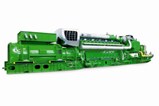GE Energy Introduces 4-MW Jenbacher Gas Engine, 24-Cylinder Unit

 Jenbach, Austria - GE Energy's Jenbacher gas engine business is presenting the 4-MW, J624 GS Jenbacher gas engine, the first 24-cylinder unit. The engine, successfully running on the test bench in Jenbach, represents a quantum leap in gas engine technology and builds on GE's expertise in advanced high-speed gas engine technology for commercial on-site power applications.
Jenbach, Austria - GE Energy's Jenbacher gas engine business is presenting the 4-MW, J624 GS Jenbacher gas engine, the first 24-cylinder unit. The engine, successfully running on the test bench in Jenbach, represents a quantum leap in gas engine technology and builds on GE's expertise in advanced high-speed gas engine technology for commercial on-site power applications.
The new engine provides the same fuel flexibility (including landfill and coal mine gas or alternative fuels like biogas, sewage gas and industrial waste gas) and high reliability offered by the entire Jenbacher gas engine portfolio.
Initially, the new engine will be operated with natural gas, and its first customers will be greenhouse operators in the Netherlands. The power and heat created by Jenbacher gas engine cogeneration systems in greenhouses are used in various ways. The electricity can provide the power for the artificial lighting and/or be fed into the public grid, the heat efficiently meets the greenhouse's heating requirements, and the CO2 of the engine exhaust gas can be used as a fertilizer for the plants. In the next step, this engine will be used for coal mine gas solutions. Coal mine methane is highly associated with the greenhouse gas effect, and Jenbacher engines that utilize the gas can offer a high potential to reduce CO2 emissions.
Growing demand for more powerful units
GE is already a leading provider of engines with outputs between 0.25 MW and 3 MW.
In introducing the new 4-MW engine, the latest Jenbacher type 6 unit, GE meets a growing demand from its customers for a more powerful gas engine for various applications.
"We are excited about the introduction of our new 4-MW, 24-cylinder engine to GE Energy's Jenbacher product line," said Steve Bolze, President of Power Generation for GE Energy. "GE Energy is committed to providing a broad diversity of technology solutions required to support the growing demand for electricity around the globe. Our Jenbacher gas engines offer great application flexibility and world class technology to help customers meet this need."
"We are very proud to introduce the new J624 GS as the newest member of our family of highly reliable, durable and flexible Jenbacher type 6 gas engines," said Prady Iyyanki, CEO of GE Energy's Jenbacher gas engine business. "Our new J624 GS is designed to help us address our customers' expanding output efficiency requirements for power generation, based on Jenbacher well-proven technology concepts."
Iyyanki added, "To illustrate the capacity of our new model: With an electrical output of 4 MW, a single J624 GS can meet the electricity requirements of about 9,000 European households. Additionally, used as cogeneration application, the engine produces about 3.6 MW of heat – allowing for overall plant efficiencies of up to 90%. To do so, the engine needs about 870 m³ of natural gas an hour."
As more industrial customers around the world seek to enhance their energy security with on-site power plants, and output needs are growing, the highly integrated and standardized J624 GS package offers a cost-effective solution.
Numerous advantages
High-speed engines like the J624 result in high power density as well as low installation costs, since they are smaller and lighter than current medium and slow-speed engines. In addition, the J624 GS has low specific fuel consumption rate, which leads to lower operating costs.
Furthermore, the J624 GS features a high heat recovery rate via a customer-tailored, hydraulic integration of heat exchangers, allowing it to suit the individual customer's specific temperature-level requirements.
The new J624 GS will be built in GE's recently expanded gas engine manufacturing facilities in Jenbach, Austria, which has been seeing a sharp increase in worldwide demand for power generation with gas engines.
Technological solution
The J624 GS's new engine and package concept consists of a gas engine mounted on a base frame as well as a vibration-decoupled turbocharger group, which results in lower transmission of engine vibrations to other equipment. This group includes turbo chargers, heat exchangers with piping and control valves, gas train, gas dosing valve and gas mixer, interface panel, and standardized hydraulic interfaces to the customer.
Volker Schulte, Leader of the Research & Development Department for GE's Jenbacher gas engines, said: "We managed to meet a number of technological challenges in designing this new engine. These include designing both engine and turbochargers for an extremely high mean effective pressure, controlling the vibrations by decoupling the intercooler and turbochargers, optimizing the combustion sequence, and increasing the mechanical strength of the crankshaft. Due to the dedication of all the staff involved in Jenbach, intensive simulations, exhaustive studies, rapid prototyping, and years of cooperation with our suppliers, we were able to achieve this significant step forward in two years' time."
Further development of Jenbacher Type 6 engines
For the new J624 GS, GE further enhanced its previously launched Type 6 engine design featuring Miller valve timing, optimized mixture forming and controls, which leads to high efficiency levels and specific output values with high-speed gas engines. The current type 6 engines – available as 12-, 16- and 20-cylinder versions – have an electrical output between 1.8 and 3-MW. Since 1989, more than 1,600 type 6 engines have been delivered worldwide.
GE's J624 GS lean burn, turbo-charged and mixture-cooled gas engine is the logical "next step" in the evolution of the Jenbacher type 6 engine family after successfully first introducing its 20-cylinder models. The newest engine is a compact, high-speed power unit with 1,500 rpm, representing the first high-speed gas engine in the 4-MW power generation segment.
SOURCE: GE Energy
